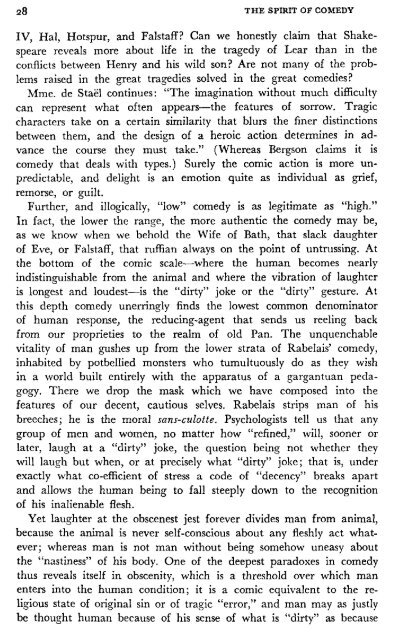The Meanings of Comedy* - Shakespeare Navigators
The Meanings of Comedy* - Shakespeare Navigators
The Meanings of Comedy* - Shakespeare Navigators
Create successful ePaper yourself
Turn your PDF publications into a flip-book with our unique Google optimized e-Paper software.
28 TIIE SPIRIT OF COMEDY<br />
IV, Hal, Ifotspur, and Falstaff Can we honestly claim that <strong>Shakespeare</strong><br />
reveals more about life in the tragedy <strong>of</strong> Lear than in the<br />
conflicts between Henry and his wild son Are not many <strong>of</strong> the prob-<br />
Iems raised in the great tragedies solved in the great comedies<br />
Mme. de StaEI continues: "<strong>The</strong> imagination without much difficulty<br />
can represent what <strong>of</strong>ten appears-the features <strong>of</strong> sorrow. Tragic<br />
characters take on a certain similarity that blurs the finer distinctions<br />
between them, and the design <strong>of</strong> a heroic action determines in advance<br />
the course they must take." (Whereas Bergson claims it is<br />
comedy that deals with types.) Surely the comic action is more unpredictablg<br />
and delight is an emotion quite as individual as grief,<br />
remorse, or guilt.<br />
Further, and illogically, "low" comedy is as legitimate as "high."<br />
In fact, the Iower the range, the more authentic the comedy may be,<br />
as we know when we behold the Wife <strong>of</strong> Bath, that slack daughter<br />
<strong>of</strong> Eve, or Falstaff, that ruffian always on the point <strong>of</strong> untrussing. At<br />
the bottom <strong>of</strong> the comic scale-where the human becomes nearly<br />
indistinguishable from the animal and where the vibration <strong>of</strong> laughter<br />
is longest and loudest-is the "dirty" joke or the "dirty" gesture. At<br />
this depth comedy unerringly finds the lowest common denominator<br />
<strong>of</strong> human response, the reducing-agent that sends us reeling back<br />
from our proprieties to the realm <strong>of</strong> old Pan. <strong>The</strong> unquenchable<br />
vitality <strong>of</strong> man gushes up from the lower strata <strong>of</strong> Rabelais' comedy,<br />
inhabited by potbellied monsters who tumultuously do as they wish<br />
in a rvorld built entirely with the apparatus <strong>of</strong> a gargantuan pedagogy.<br />
<strong>The</strong>re we drop the mask which we have composed into the<br />
features <strong>of</strong> our decent, cautious selves. Rabelais strips man <strong>of</strong> his<br />
breechesl he is the rnaral sans-culotte. Psychologists tell us that any<br />
group <strong>of</strong> men and women, no matter how "refined," will, sooner or<br />
later, laugh at a "dirty" joke, the question being not whether they<br />
will laugh but when, or at precisely what "dirty" joke; that is, under<br />
exactly what co-efficient <strong>of</strong> stress a code <strong>of</strong> "decency" breaks apart<br />
and allows the human being to fall steeply down to the recognition<br />
<strong>of</strong> his inalienable flesh.<br />
Yet laughter at the obscenest jest forever divides man from animal,<br />
because the animal is never self-conscious about any fleshly act whateverl<br />
whereas man is not man without being somehow uneasy about<br />
the "nastiness" <strong>of</strong> his body. One <strong>of</strong> the deepest paradoxes in comedy<br />
thus reveals itself in obscenity, which is a threshold over which man<br />
enters into the human condition; it is a comic equivalent to the religious<br />
state <strong>of</strong> original sin or <strong>of</strong> tragic "error," and man may as justly<br />
be thought human because <strong>of</strong> his sense <strong>of</strong> what is "dirty" as because


